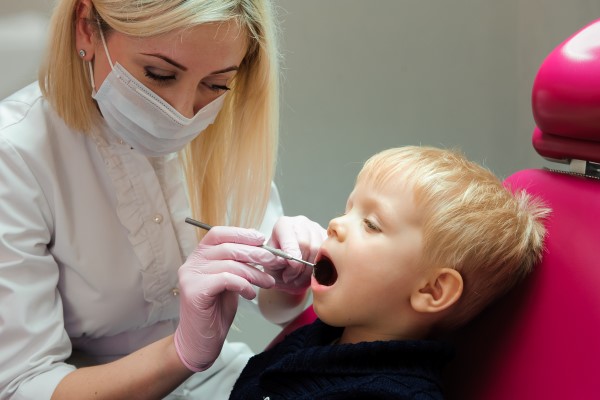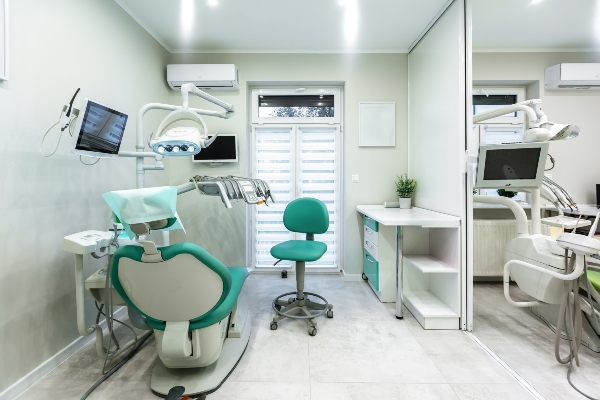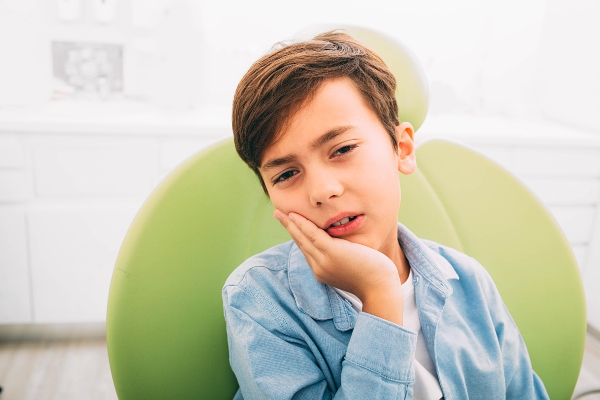How Often Should My Child See a Pediatric Dentist?

Many people believe that children can skip visiting a dentist because baby teeth do not last forever, but the opposite is true. Seeing a pediatric dentist is an essential step for the healthy development of every child. Many oral health concerns develop early on, and if not swiftly discovered and corrected, they can lead to life-long issues.
In addition, children need to develop healthy oral care habits at a young age. Seeing the dentist during the early years of life sets a precedent for prioritizing routine dental care. More importantly, it allows children the opportunity to become more comfortable with visiting a dental office for cleanings and examinations. Regular childhood dental visits can help many people avoid dental anxiety in the future as an adult.
There are many benefits to starting professional dental care at a young age. It is also important to maintain these routine visits throughout childhood. Even if your child has healthy gums, strong teeth, and no signs of decay, they should continue seeing a dentist as recommended. Follow this guide to know when to schedule pediatric dental trips during these critical years.
When should children first visit a pediatric dentist?
Generally, you should schedule your child's first pediatric dental visit upon the eruption of their first tooth or right after their first birthday, whichever comes first. Most babies develop their first tooth around six to nine months of age, though later appearances do occur and are not necessarily a sign of any issues. Regardless of when it occurs, baby tooth eruption leaves the tooth and surrounding tissues open to infection. Like adults, baby teeth and gums sometimes develop cavities, infection, disease, and positioning concerns.
Even before the tooth erupts, baby bottles, breastfeeding, and fruit juices may cause oral misalignment, erosion, or decay. You must consistently and correctly take care of these baby teeth and gumlines to prevent these possible early issues. Pediatric dentists are specially trained to inspect and handle children's mouths, dental issues, and the unique problems that kids sometimes develop. Pediatric dentists also work to discover and correct many oral issues in the earlier stages of their development to prevent those issues from carrying over into adulthood.
How often should children see their pediatric dentist?
You might think that babies and younger individuals do not need to go to the dentist as frequently as adults do, but on the contrary, children should actually see their dentists more often. Most children should visit the dentist at least twice a year. Young people with particular health issues, a family history of oral health issues, or special mental or physical needs may need to head to the dentist even more frequently. Always discuss your options with your pediatric dentist and establish an appropriate schedule for your child's personal needs.
While it is true that adult, permanent teeth will eventually replace all your child's baby teeth, any infection and disease that has already begun in their mouth may not disappear along with these temporary teeth. Pediatric dentists have the education and experience necessary to detect these oral issues and address them before they cause perpetual damage. In addition, babies and kids also need their teeth to learn to speak and eat properly. Inefficient mouth care can thus lead to developmental issues beyond simple hygiene as well. Pediatric dentists are aware of this additional importance regarding children's dental care, so they work with you and your child to help develop good speaking and eating abilities while also maintaining consistent and accurate oral health care habits for your child.
Conclusion
Routine dental visits twice a year or more are vital for maintaining good oral and developmental health in children. Every child should regularly see a pediatric dentist, starting when the first baby tooth appears and continuing until the last adult one arrives. These dental professionals can help detect problems early on, resulting in more treatment options and a better overall outcome. They can also offer insight into lifestyle changes and home cleaning techniques to improve your child's oral health.
It is never too early to develop a good oral maintenance routine. While good home care is essential, professional care is just as important. Starting at a young age can help your child avoid unnecessary complications while building healthy habits that can last a lifetime. If your child is past the age of one and has never visited a dentist, now is the time to make that first appointment. Contact our office today to schedule a pediatric dental consultation and exam.
Check out what others are saying about our dental services on Yelp: Pediatric Dentist in Middletown, NY.
Recent Posts
Getting good oral care early in life makes a big difference, but searching “pediatric dentist near me” might not be enough to clarify exactly why. Parents and kids alike can benefit from understanding what a dentist does to help children grow up with strong, healthy smiles, and it goes beyond cleaning the teeth. Here are…
A kids dentist is a dental professional that teaches children how to take care of their teeth and gums from a young age. These practices, when established at an early age, provide the foundation for a lifetime of good oral hygiene. This article covers how this type of dentist can teach kids and their parents…
A child dentist can help your child achieve better dental and general health. Regular visits allow your child to get used to dental checks, tools, and equipment. Dental fear disappears, and the young patient can continue having a bright, painless smile. Here are what parents like you should look forward to during child dentist appointments.Choosing…
Cavity treatment for kids is essential for a child’s oral health. Dental decay can cause discomfort, causing the child to lose focus at school. It can even result in low self-esteem and malnutrition. Treating cavities can improve your child’s general health. Here are effective techniques for cavity treatment for kids.There are cases when fillings cannot…


